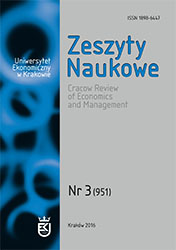Badanie wpływu metody estymacji teoretycznych modeli rozkładu dochodów na jakość aproksymacji rozkładu dochodów mieszkańców Krakowa
The Effects of Parameter Estimation Methods of Theoretical Models of Income Distribution on the Quality of Approximation of the Empirical Income Distribution of the Inhabitants of Cracow
Author(s): Marcin SalamagaSubject(s): Social Sciences, Economy, Sociology, Social differentiation
Published by: Wydawnictwo Uniwersytetu Ekonomicznego w Krakowie
Keywords: income distribution; maximum likelihood method; Gini coefficient; Singh Maddala distribution
Summary/Abstract: The purpose of this article is to find theoretical models and the best estimation methods that as closely as possible reflect the income distribution of the inhabitants of Cracow. The study took into account models most commonly used in the analysis of wages and incomes – Singh Maddala, Fisk, log-normal distribution, and gamma distribution. Selected distributions were tested for their precision in estimating the measures of position, dispersion, and inequality in empirical income distribution depending on the method of parameter estimation used. To estimate the models, data on the individual income of the inhabitants of Cracow in 2013 were used; the data were taken from the “Social Diagnosis” database. The results indicate that the most precise estimation of income distribution and its characteristics can be achieved using Singh Maddala distribution, while the recommended parameter estimation methods is maximum likelihood method.
Journal: Zeszyty Naukowe Uniwersytetu Ekonomicznego w Krakowie
- Issue Year: 951/2016
- Issue No: 03
- Page Range: 63-79
- Page Count: 17
- Language: Polish

